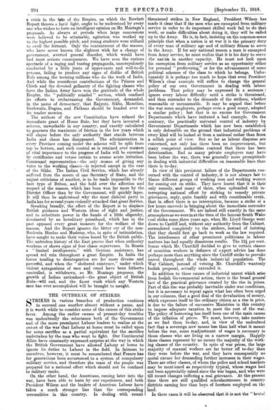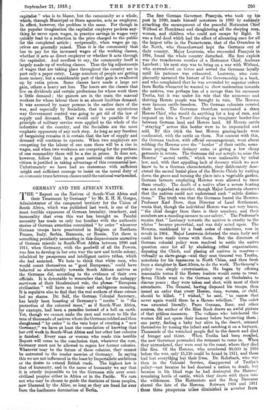THE OUTBREAK OF STRIKES.
STRIKES in various branches of production continue to succeed one another almost without a pause, and It is worth while to consider some of the- causes of this -strike fever. Among the earlier - causes of present-day troubles was undoubtedly the reluctance both of the Government and of the more- prominent Labour leaders to realize at the outset of the -war that Labour at--home--must be called upon for some sacrifice as a partial equivalent for the sacrifice undertaken by the men who went to fight. Our Continental Allies have constantly expressed surprise at the way in- which the British Government have allowed' Labour at home to ignore its duties to Labour in the field. In fairness to ourselves, however, it must be remembered that France-has for generations been accustomed to a system of compulsory military service, and therefore the mass of the people was prepared for a national effort which should not be confined to military ranks.
On the other hand, the Americans, coming later -into the war, have been able to learn by our experiences, and both • President Wilson and the leaders of American Labour have taken a mUch stronger line than the corresponding lersonalities in this country. In -dealing with -recent -threatened -strikes in New England, President Wilson has made it clear that if the men who are exempted from military service in order to do important skilled work fail to do that work, or make difficulties about doing it, they will be called up to the Army. He is,. in fact, insisting on the common-sense principle that when a nation is at war it is the primary duty of every man of military age and of military fitness to serve in the Army. If for any national reason a man is exempted from Army service, he must realize that it is his duty to serve the nation in another capacity. He must not look upon his exemption from military service as an opportunity either for personal "profiteering," or for the advancement of some political schemes of the class to which he belongs. Unfor- tunately it is perhaps -too much to hope that even President Wilson's clear example will suffice to change the general policy of our own Government in dealing with labour problems. That policy may be expressed in a sentence : ignore every labour difficulty until a strike is threatened, and then surrender to the demands of the strikers', whether reasonable or unreasonable. It may be argued that before the war some employers, perhaps even a good many, adopted a similar policy ; but that is no excuse for Government Departments which have imitated a bad example. On the contrary, the practically universal -control of industry by Government Departments which has now been , established is only defensible on the ground that industrial problems of every kind will be looked at from a national rather than from a selfish point of view. But so far as labour disputes are concerned, not only has there been no improvement, but many competent authorities contend that there has -been deterioration. Bad as many private employers may have been before the war, there was generally more promptitude in dealing with industrial difficulties on reasonable lines than there is to-day.
In view of this persistent failure of the Departments con- cerned with the control of industry, it is not always fair to blame different groups of working men and working women for coming out on strike. They have learnt that it is their only remedy, and many of them, when upbraided with in- terrupting national effort by striking to remedy private grievances, reply, quite frankly and with considerable truth, that in effect there is no interruption, because a strike of a few hours succeeds in bringing about the immediate surrender of the Government. We are indeed still exactly in the same _atmosphere as we werein at the time of the famous South Wales coal strike someithree years ago, when Mr. Lloyd George went down to Cardiff and, without any authority from the Cabinet, surrendered completely to the strikers, instead of insisting that they should first go back to work as the law required. The interference of other prominent politicians in labour matters has had equally disastrous results. The 121 per cent. bonus which Mr. Churchill deeided to give to certain classes of munition workers in defiance of expert advice has done perhaps more than anything since the Cardiff strike to provoke unrest throughout the whole industrial population. The War Cabinet, instead of vetoing .Mr. Churchill's -wantonly foolish proposal, actually extended it.
In addition to these causes of industrial unrest which arise from foolish Governmental action, there is the broad general fact of the practical grievance created by the rise in prices. Part of this rise was probably inevitable under war conditions, but it is. necessary to repeat again what has often been urged in our columns, that a good deal of the devalnation of money, which expresses itself to the ordinary citizen as a rise in price, is due to the failure of successive Ministries in this country to impose adequate taxation to meet the cost of' the war. The policy of borrowing has itself been one of the main causes of the inflation of prices. We must, however, take matters as we find, them to-day, and, in view of the undoubted fact that a sovereign now means less than half what it meant before the war, some readjustment of wages is necessary in those classes who are living on a narrow margin. Happily these classes represent by no means the majority of the work- ing classes of the country. In spite of war prices, the large majority of manual workers are far better off to-day than they were before the war, and they have consequently no moral excuse for 'demanding further increases in their wages. There are other classes, of whom the police and school teachers may be mentioned as respectively typical, whose wages had not been appreciably raised since the war began, and who were till recent changes suffering a real grievance. At the-present time there are -still qualified schoolmistresses in country districts earning less than boys of fourteen employed on the land.
In these cases it will ,be observed tliat it is not the "brutal capitalist" who is to blame, but the community as a whole, which; through Municipal. or State agencies, acts. as employer. In effect, however, the problem is the same. For though in the popular imagination the capitalist employer pockete any-- thing he saves upon wages, in practice savings in wages very quickly, lead to a reduction in the price charged to the, public for the completed article; reciprocally, when wages go up, prices are generally raised. Thus it is the community that has to pay for the increased wages of the working classes,. whether it acts as direct employer -or whether it acts through the capitalist. And needless to say, the community itself is largely made.up of working classes. Thus the big adjustments of wages that are taking place throughout the country are in part only a paper entry. Large numbers of people are getting more money, but a considerable part of their gain is swallowed up by extra prices. Some classes have made a large net gain, others a heavy net loss. The losers are the classes that live on dividends and certain professions for whose work there- is little demand ; the gainers are in the main the manual workers for whose labour there is an almost limitless demand. It was assumed by many persons in the earlier days of the war, and especially by Socialists, that in some mysterious way Government control was going to get rid of the law of supply and demand. That would only be possible if the principle of military service were applied to the whole of the industries of the country, and the Socialists are the most emphatic opponents of any such step. As long as any freedom of bargaining remains it is certain that therlaw of supply and demand will continue to operate. When two employers are competing for the labour of one man there will be a rise in wages, and when two workmen are competing for the purchase of one commodity there will be a rise in prices. It does not, however, follow that in a great national crisis the private citizen is justified in taking advantage of this commercial law. Unfortunately- we have had no statesman with sufficient nsight, and sufficient courage to insist on the moral duty of an economic truce between classes until the national war is ended.



































 Previous page
Previous page